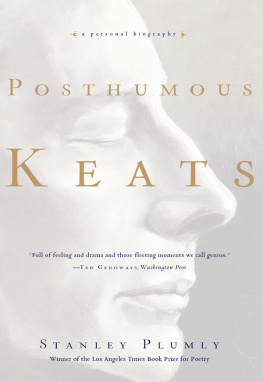John Keats - Lamia
Here you can read online John Keats - Lamia full text of the book (entire story) in english for free. Download pdf and epub, get meaning, cover and reviews about this ebook. year: 2000, genre: Science. Description of the work, (preface) as well as reviews are available. Best literature library LitArk.com created for fans of good reading and offers a wide selection of genres:
Romance novel
Science fiction
Adventure
Detective
Science
History
Home and family
Prose
Art
Politics
Computer
Non-fiction
Religion
Business
Children
Humor
Choose a favorite category and find really read worthwhile books. Enjoy immersion in the world of imagination, feel the emotions of the characters or learn something new for yourself, make an fascinating discovery.

- Book:Lamia
- Author:
- Genre:
- Year:2000
- Rating:3 / 5
- Favourites:Add to favourites
- Your mark:
- 60
- 1
- 2
- 3
- 4
- 5
Lamia: summary, description and annotation
We offer to read an annotation, description, summary or preface (depends on what the author of the book "Lamia" wrote himself). If you haven't found the necessary information about the book — write in the comments, we will try to find it.
Lamia — read online for free the complete book (whole text) full work
Below is the text of the book, divided by pages. System saving the place of the last page read, allows you to conveniently read the book "Lamia" online for free, without having to search again every time where you left off. Put a bookmark, and you can go to the page where you finished reading at any time.
Font size:
Interval:
Bookmark:
The Project Gutenberg EBook of Lamia, by John Keats
This eBook is for the use of anyone anywhere at no cost and with
almost no restrictions whatsoever. You may copy it, give it away or
re-use it under the terms of the Project Gutenberg License included
with this eBook or online at www.gutenberg.org
Title: Lamia
Author: John Keats
Release Date: December 23, 2008 [EBook #2490]
Last Updated: February 4, 2013
Language: English
*** START OF THIS PROJECT GUTENBERG EBOOK LAMIA ***
Produced by An Anonymous Volunteer, and David Widger
Drove Nymph and Satyr from the prosperous woods,
Before King Oberon's bright diadem,
Sceptre, and mantle, clasp'd with dewy gem,
Frighted away the Dryads and the Fauns
From rushes green, and brakes, and cowslip'd lawns,
The ever-smitten Hermes empty left
His golden throne, bent warm on amorous theft:
From high Olympus had he stolen light,
On this side of Jove's clouds, to escape the sight
Of his great summoner, and made retreat
Into a forest on the shores of Crete.
For somewhere in that sacred island dwelt
A nymph, to whom all hoofed Satyrs knelt;
At whose white feet the languid Tritons poured
Pearls, while on land they wither'd and adored.
Fast by the springs where she to bathe was wont,
And in those meads where sometime she might haunt,
Were strewn rich gifts, unknown to any Muse,
Though Fancy's casket were unlock'd to choose.
Ah, what a world of love was at her feet!
So Hermes thought, and a celestial heat
Burnt from his winged heels to either ear,
That from a whiteness, as the lily clear,
Blush'd into roses 'mid his golden hair,
Fallen in jealous curls about his shoulders bare.
From vale to vale, from wood to wood, he flew,
Breathing upon the flowers his passion new,
And wound with many a river to its head,
To find where this sweet nymph prepar'd her secret bed:
In vain; the sweet nymph might nowhere be found,
And so he rested, on the lonely ground,
Pensive, and full of painful jealousies
Of the Wood-Gods, and even the very trees.
There as he stood, he heard a mournful voice,
Such as once heard, in gentle heart, destroys
All pain but pity: thus the lone voice spake:
"When from this wreathed tomb shall I awake!
When move in a sweet body fit for life,
And love, and pleasure, and the ruddy strife
Of hearts and lips! Ah, miserable me!"
The God, dove-footed, glided silently
Round bush and tree, soft-brushing, in his speed,
The taller grasses and full-flowering weed,
Until he found a palpitating snake,
Bright, and cirque-couchant in a dusky brake.
She was a gordian shape of dazzling hue,
Vermilion-spotted, golden, green, and blue;
Striped like a zebra, freckled like a pard,
Eyed like a peacock, and all crimson barr'd;
And full of silver moons, that, as she breathed,
Dissolv'd, or brighter shone, or interwreathed
Their lustres with the gloomier tapestries
So rainbow-sided, touch'd with miseries,
She seem'd, at once, some penanced lady elf,
Some demon's mistress, or the demon's self.
Upon her crest she wore a wannish fire
Sprinkled with stars, like Ariadne's tiar:
Her head was serpent, but ah, bitter-sweet!
She had a woman's mouth with all its pearls complete:
And for her eyes: what could such eyes do there
But weep, and weep, that they were born so fair?
As Proserpine still weeps for her Sicilian air.
Her throat was serpent, but the words she spake
Came, as through bubbling honey, for Love's sake,
And thus; while Hermes on his pinions lay,
Like a stoop'd falcon ere he takes his prey.
"Fair Hermes, crown'd with feathers, fluttering light,
I had a splendid dream of thee last night:
I saw thee sitting, on a throne of gold,
Among the Gods, upon Olympus old,
The only sad one; for thou didst not hear
The soft, lute-finger'd Muses chaunting clear,
Nor even Apollo when he sang alone,
Deaf to his throbbing throat's long, long melodious moan.
I dreamt I saw thee, robed in purple flakes,
Break amorous through the clouds, as morning breaks,
And, swiftly as a bright Phoebean dart,
Strike for the Cretan isle; and here thou art!
Too gentle Hermes, hast thou found the maid?"
Whereat the star of Lethe not delay'd
His rosy eloquence, and thus inquired:
"Thou smooth-lipp'd serpent, surely high inspired!
Thou beauteous wreath, with melancholy eyes,
Possess whatever bliss thou canst devise,
Telling me only where my nymph is fled,
Where she doth breathe!" "Bright planet, thou hast said,"
Return'd the snake, "but seal with oaths, fair God!"
"I swear," said Hermes, "by my serpent rod,
And by thine eyes, and by thy starry crown!"
Light flew his earnest words, among the blossoms blown.
Then thus again the brilliance feminine:
"Too frail of heart! for this lost nymph of thine,
Free as the air, invisibly, she strays
About these thornless wilds; her pleasant days
She tastes unseen; unseen her nimble feet
Leave traces in the grass and flowers sweet;
From weary tendrils, and bow'd branches green,
She plucks the fruit unseen, she bathes unseen:
And by my power is her beauty veil'd
To keep it unaffronted, unassail'd
By the love-glances of unlovely eyes,
Of Satyrs, Fauns, and blear'd Silenus' sighs.
Pale grew her immortality, for woe
Of all these lovers, and she grieved so
I took compassion on her, bade her steep
Her hair in weird syrops, that would keep
Her loveliness invisible, yet free
To wander as she loves, in liberty.
Thou shalt behold her, Hermes, thou alone,
If thou wilt, as thou swearest, grant my boon!"
Then, once again, the charmed God began
An oath, and through the serpent's ears it ran
Warm, tremulous, devout, psalterian.
Ravish'd, she lifted her Circean head,
Blush'd a live damask, and swift-lisping said,
"I was a woman, let me have once more
A woman's shape, and charming as before.
I love a youth of CorinthO the bliss!
Give me my woman's form, and place me where he is.
Stoop, Hermes, let me breathe upon thy brow,
And thou shalt see thy sweet nymph even now."
The God on half-shut feathers sank serene,
She breath'd upon his eyes, and swift was seen
Of both the guarded nymph near-smiling on the green.
It was no dream; or say a dream it was,
Real are the dreams of Gods, and smoothly pass
Their pleasures in a long immortal dream.
One warm, flush'd moment, hovering, it might seem
Dash'd by the wood-nymph's beauty, so he burn'd;
Then, lighting on the printless verdure, turn'd
To the swoon'd serpent, and with languid arm,
Delicate, put to proof the lythe Caducean charm.
So done, upon the nymph his eyes he bent,
Full of adoring tears and blandishment,
And towards her stept: she, like a moon in wane,
Faded before him, cower'd, nor could restrain
Her fearful sobs, self-folding like a flower
That faints into itself at evening hour:
But the God fostering her chilled hand,
She felt the warmth, her eyelids open'd bland,
And, like new flowers at morning song of bees,
Bloom'd, and gave up her honey to the lees.
Into the green-recessed woods they flew;
Nor grew they pale, as mortal lovers do.
Left to herself, the serpent now began
To change; her elfin blood in madness ran,
Her mouth foam'd, and the grass, therewith besprent,
Wither'd at dew so sweet and virulent;
Her eyes in torture fix'd, and anguish drear,
Hot, glaz'd, and wide, with lid-lashes all sear,
Flash'd phosphor and sharp sparks, without one cooling tear.
The colours all inflam'd throughout her train,
Font size:
Interval:
Bookmark:
Similar books «Lamia»
Look at similar books to Lamia. We have selected literature similar in name and meaning in the hope of providing readers with more options to find new, interesting, not yet read works.
Discussion, reviews of the book Lamia and just readers' own opinions. Leave your comments, write what you think about the work, its meaning or the main characters. Specify what exactly you liked and what you didn't like, and why you think so.







